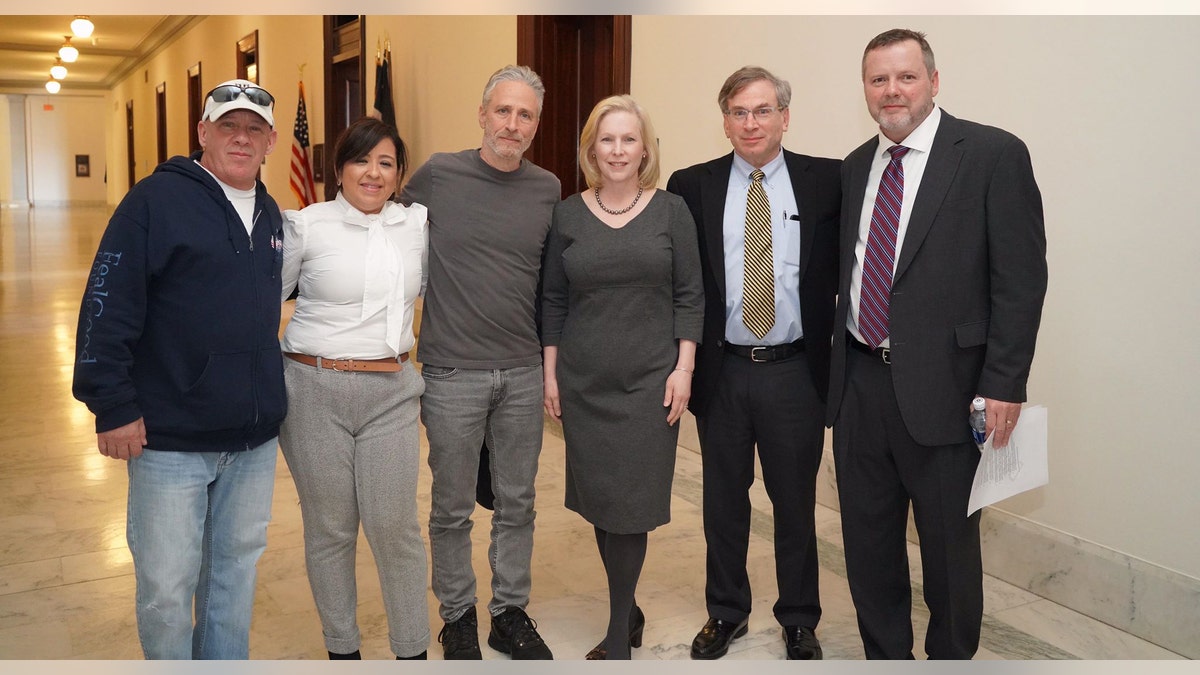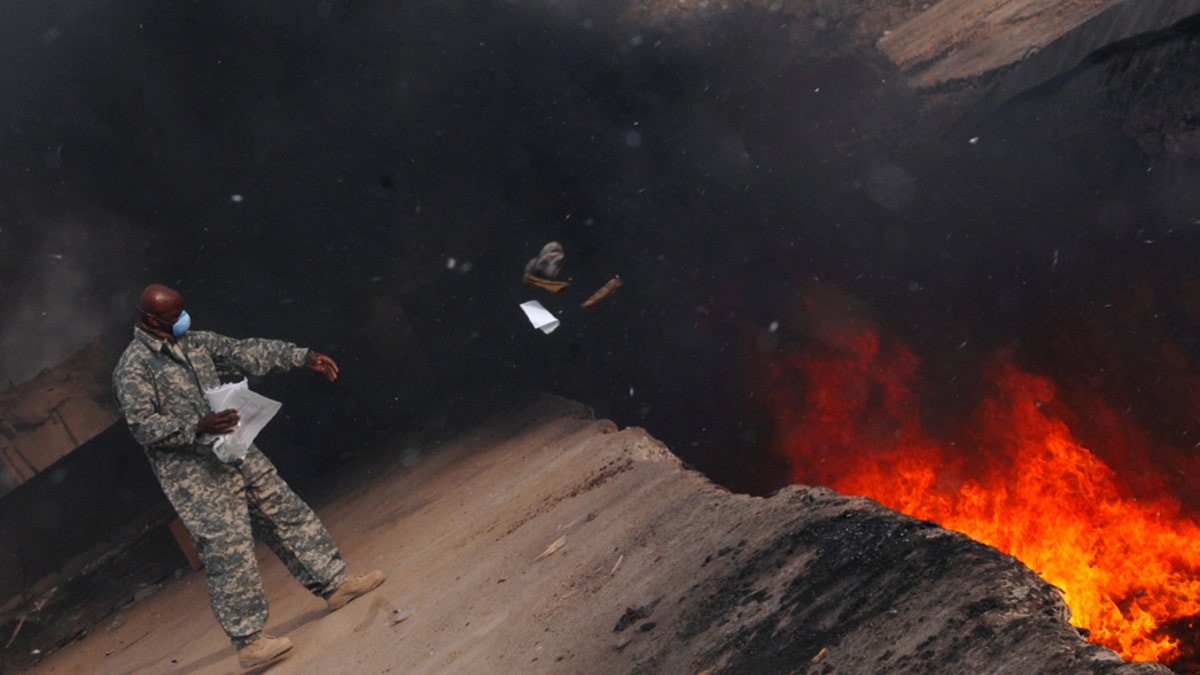Stewart on 'heartbreaking' health effects for veterans exposed to 'burn pits'
Activist and comedian says we can't leave servicemembers hanging 'this is the cost of war' on 'The Story'
Jon Stewart returned to Washington on Tuesday in a continued effort to help the 3 million-plus veterans believed to have been made sick from their exposure to burn pits.
The comedian and advocate, who successfully helped 9/11 first responders receive access to a crucial compensation fund, has been working with a coalition of veteran advocates in their efforts to lobby for the passage of a new bill, which will list burn pit exposure as a presumptive condition for any service member who fought in the wars in Iraq and Afghanistan.
Stewart was in Washington on Tuesday for a news conference to bring attention to The Presumptive Benefits for War Fighters Exposed to Burn Pits and Other Toxins Act -- a bipartisan bill sponsored by Sens. Kirsten Gillibrand, D-N.Y., and Marco Rubio, R-Fla., along with Rep. Raul Ruiz, D-Calif., that would require the Department of Veterans Affairs (VA) to provide health and disability services to Global War on Terror (GWOT) veterans who served in places like Iraq, Afghanistan and other locations where they were exposed to toxins.
"For those that have fought and defended and served this country, for them to come home and have to fight against the very government that they volunteered to defend is immoral. It's unconscionable and it's easily remedied," Stewart said during the press conference that was held outside the VFW's headquarters in Washington, D.C.
"If you serve overseas and you come home, or you serve in general and you've been exposed to toxic waste or any of those things, it's a battle," he added. "We've still got Vietnam War veterans fighting to get diseases covered for Agent Orange. This has to stop. They don't need a concession of exposure. They don't need a presumptive process to exposure. They need presumption, presumption of exposure to toxicity, and they need the health care and benefits associated with that."

Jon Stewart (center) has been working with Senator Kirsten Gillibrand (D-NY, center) along with advocates John Feal (left) and Rosie Torres (left), founder of Burn Pits 360. (Courtesy of Rosie Torres)
In advance of a news conference with the sponsors of the bill, the former host of "The Daily Show" spoke with the Investigative Unit at Fox News about why the veterans of the wars in Iraq and Afghanistan should be given presumptive care.
"The reason why presumption is the way to go is we have the science for so many of these illnesses caused by these toxic exposures, right," Stewart said. "Just because the VA [Office of Veteran's Affairs] says they don't have the science because the NAS [National Academy of Sciences] hasn't done the proper study or has the insufficient data, the science on toxic exposure. ... You know, if you go to the EPA's website. They call them burn barrels, and that's on a much smaller scale, but they say the reason you're not allowed to use burn barrels is dioxins are produced. All kinds of other hazardous toxins, ash, particulate, and these things are correlated to and then they list lung diseases, cancers, pulmonary issues, developmental disorders, neuromuscular disorders. It's on the EPA website."
He continued: "They didn't ban the practice here in the United States arbitrarily. They banned it because of the dire health conditions that are born of this practice."
The Investigative Unit at Fox News has reported extensively on the fears that veterans have been made sick by exposure to fumes from burn pits. Many soldiers said the pits were a crude method of incineration in which every piece of waste was burned, including plastics, batteries, appliances, medicine, dead animals, and even human waste.
The items often were set ablaze with jet fuel as the accelerant. The pits burned more than 1,000 different chemical compounds day and night. Most service members breathed in toxic fumes with no protection. According to a registry created by the VA, over 200,000 vets said the exposure made them ill, but the department denied assistance to many of them.
"They didn't ban the practice here in the United States arbitrarily. They banned it because of the dire health conditions that are born of this practice."
Many veterans and their families have said that their experience trying to obtain assistance with health care coverage left them feeling as if they were being treated as if they were attempting to run a scam to obtain money from the federal government.
"They make you feel like, I don't want to say that you're doing something wrong, but almost like you're doing something that's suspicious or you're being sneaky or you're trying to take advantage of something that's not for you," Gina Cancelino, whose husband Joseph served in Iraq in 2003 as a gunnery sergeant for the Marines, told Fox News. He passed away in 2019 after being diagnosed with cancer only two years earlier. "My children lost their father. He'll never get to do anything with them. He'll never see them do anything. They'll never have him around again. And he was the provider for this family. You're going to tell me I'm not entitled to something. You're going to make me feel as if I'm trying to get over on you."
Cancelino, who now works with veteran advocacy group Burn Pits 360, added she was unable to add her husband’s name to the burn pit registry because he had already passed away and that she was denied VA disability benefits for herself and her two children until she can prove that her husband's cancer was directly correlated to his direct service connection to burn pits and toxic exposure while serving in Iraq.
"How many people are like myself and my children who didn't know this was an issue, didn't know this was something to be considered and have either lost somebody or a fighting that fight now or didn't even submit any forms because they didn't even know that this was something that was that was available," she said.
The Presumptive Benefits bill was originally introduced in September of last year but was reintroduced last month with updated criteria for presumptive care. The bill previously required that servicemembers had to show that they had to prove a minimum of 15 days of their service.
CORONAVIRUS PUTS VETERAN'S BURN-PIT RESPIRATORY ISSUES TO THE TEST
In an attempt to simplify eligibility, the updated bill now favors veterans having relevant service medals received after their tour of duty instead of documentation that they served a minimum number of days, a crucial step, proponents of the bill say. Listing their service as a presumptive condition will help to provide needed care to millions of veterans.

Thousands of U.S. military personnel who served on bases in Iraq and Afghanistan were exposed to the dense black smoke (Public Domain)
"These are men and women who have sacrificed everything for our country and now they're sacrificing their lives because of diseases that are caused by their exposure, that they had no say about being stationed next to a burn pit," Gillibrand, a co-sponsor of the bill, said in an interview with Fox News. "We know burn pits are deadly. That's why they're banned in the United States."
"The epidemiology already exists for most of these diseases because we know the nature of what's burned in the burn pit is identical to the stuff that was burned on 9/11 and the weeks and months on the pile thereafter. And there's a ton of work done to show causation with all the research done over the last 15 years."
CLICK HERE TO GET THE FOX NEWS APP
Stewart says that the current system in place is flawed and that the VA needs to understand that toxic wounds are just as deadly as bullet wounds. He also believes that the health care process given to 9/11 first responders could help save veterans as well.
"They need presumption of exposure and they need to immediately be placed in a program that mirrors the 9/11 program, which has metal screenings that tend towards what are the illnesses that come from these sorts of toxic exposures and then any of the health care benefits that come from the diseases," he said during an interview on "The Story with Martha MacCallum. "
He continued: "So it's it's a simple program. We already have the blueprint. It's going to come down to money. And my feeling about the money is this is the cost of war. This is the total cost of war. You don't get to pay for one aspect of the war and not the other."





